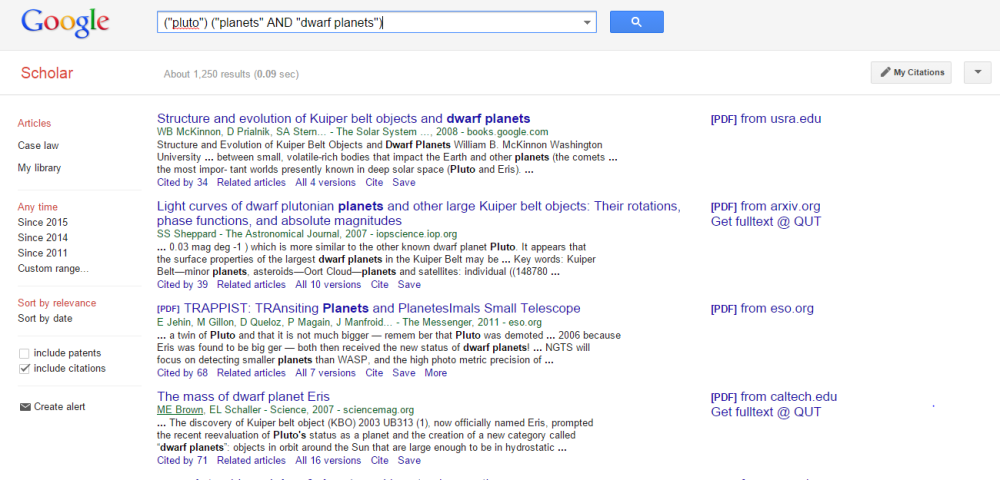The difference between Google and Google Scholar is clearly discernible from the difference in their names. While Google searches a wide variety of sources, including blogs, journals, webpages, social media, etc., Google Scholar is restricted to works of academic importance, such as books, journals, and reports, to name a few. I am not a regular user of Google Scholar, I prefer the original Google for my research as I like the inclusion of blogs within the results, however I am excited to see how Google Scholar compares. I do have high expectations of the results I will receive when applying Boolean Operators to my searches.
To demonstrate expert searching techniques for Google Scholar, I will research my first initial question; this shall allow me to make direct comparisons between Google and Google Scholar. The question I shall be researching is:
In what way do our emotions either support or hinder student learning experiences, and how can we harness them during inquiry learning?
As with my Google expert searching, I shall start with some basic terminology and record the number of results, comment on the relevance of the results, and rate the search from 1 (lowest) to 10 (highest). I have presented my findings in a table:
| Phrase | Results | Commentary | Rating |
| Inquiry learning | 1,790,000 | A wide variety of results were returned for this search, ranging from what inquiry learning is, to technological advances in inquiry learning. I found the results to be lacking in uniformity and all over the place in terms of content. This would not be a good place to start without having prior knowledge of inquiry learning. | 2 |
| “Inquiry learning” | 27,000 | Although a significantly smaller number of results, there was still a large amount of differentiation between the results. There appears to be a large influence of technology in inquiry learning within these results. | 2 |
| “Guided inquiry” | 13,700 | The results for this search were orientated towards work places and goals. There were significantly less references that are educational based within this search. An addition of “reward-guided” by Google Scholar greatly affected the results. | 1 |
| “Inquiry learning” “student centred” | 4,560 | Significantly less results again with this search. The addition of “student centered” has greatly impacted the results returned. All results are now orientated towards an educational context. | 5 |
| “emotions” “learning” | 1,240,000 | Due to the number of results returned and the vagueness of the search, the variety of results is vast and a little overwhelming. Results range from how to deal with the emotions experience throughout university, to learning to talk about our emotions, to the impact of emotions on learning (perhaps the most relevant result of all). | 3 |
| “emotions” “inquiry learning” | 2,790 | A significantly smaller result return than the previous search, simply by adding inquiry. The results were orientated more towards a tertiary educational context, often neglecting to reference the importance of emotions in creating authentic learning experience, but focusing more on how our emotions can prevent learning due to stress. | 4 |
Through these simple searches, it has become very clear to me that Google Scholar requires more direction towards the desired outcomes. The following 4 searches shall demonstrate my meaning in this.
Search 1: By including AND primary into the search, I was rewarded with results that are orientated towards research into this issue with the primary school. The results were still highly varied in terms of learning disciplines, and research angles. This search did not specifically answer my initial question.
Search 2: By including brackets around (primary school) and -teachers from the equation, the first result returned for the second search was far more pleasing. A considerable smaller return of results, there is still a certain amount of neglect towards positive resources the impact of emotions on learning.
Search 3: Although only returning a total of 11 results, the following search was the most promising search I have conducted using Google Scholar. Although not a report on the positive effects of emotions on learning, the first result does lend support to the answer that emotions can hinder inquiry learning. The second result is also a helpful resource when discussing the impact of emotions, particularly as a positive impact. The remaining results are not particularly useful in answering the initial question.
It is clear to me that Google Scholar requires more direction within the search, and is more likely to produce smaller numbers of results that aren’t always particularly helpful. I feel that it would be fair to say that this is due to the limitations of the resources that Google Scholar has access to. I would assume that researching a well documented topic, such as a recent search I completed on the topic of Pluto:
Search 4: This search yielded significantly more relevant results. I strong believe this to be because of the number of academic sources written regarding this topic.
It is my decision, that for the purpose of answering this particular initial question, I would be more likely to refer to the results I received using the Google searches I conducted.